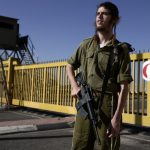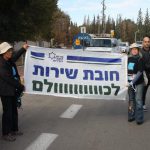The Israel Supreme Court recently struck down the law that effectively exempted most ḥaredi (“ultra-Orthodox”) yeshiva students from serving in the country’s military (Tzahal). The legal issues are complex (Hebrew readers: see here for the full decision or here for a summary), but the central question of the case carries deep social and moral implications. We are talking, after all, about whether a significant segment of Israel’s population will be exempted from shivayon banetel, from sharing equally the burden of national defense. Like many (most? almost all?) social and moral issues, it is also a question of halakhah. And that brings to mind the memory of our colleague and teacher, Rabbi Moshe Zemer, zikhrono liv’rakhah.
Moshe, who died in 2011, was the leading halakhist (and av beit din) of MARAM (Mo’etzet HaRabanim HaMitkadmim), the association of progressive rabbis in Israel. Along with Rabbi Walter Jacob, he was a founder and leader of the Solomon B. Freehof Institute of Progressive Halakhah, an editor of and prolific contributor to many of its publications. His book Halakhah sh’fuyah, published in English as Evolving Halakhah, sets forth his view of Jewish law as a dynamic and flexible system that is and always has been capable of responding positively to new questions and the challenges of changing times. One of those questions is that of military service for yeshiva students, which Moshe discusses (pp. 298-300) with his customary clarity and vigor. In light of the Supreme Court’s decision, let’s revisit his argument, which he frames as a response to a t’shuvah of Rabbi Hayyim David Halevy defending draft exemptions for full-time yeshiva students.
Rabbi Halevy bases his ruling upon an analogy between today’s full-time yeshiva students and the Biblical tribe of Levi. As Rambam reminds us,[2] the Levites were set apart from the rest of Israel in order to perform service in the Temple and to teach Torah to the people (see Deuteronomy 33:10). For that reason, they received no portion in the land and were exempt from serving in Israel’s wars. Moreover, says Rambam, this Levitical role did not end with the Temple’s destruction. In every age, one whose spirit and intellect move him to separate himself from the community to serve God can thereby attain a special level of sanctity (harei zeh nitkadesh kodesh kodashim), “and God becomes his portion in this world and the next.” Thus, Halevy’s analogy: just like the Levites, today’s yeshiva students renounce material prosperity (their “portion in the land”) in dedicating themselves to a lifetime of talmud torah, which our tradition regards as no mere intellectual or professional pursuit. On the contrary, the study of Torah, like service in the Temple, is linked intimately to “the soul and spirit of the nation” (נשמת רוח חייה של האומה) and contributes (in spiritual form) to the security of the community (במדה שעם ישראל מרבה בלימוד תורה מגדיל הוא בכך את בטחונו מכל צר ואויב). For this reason, full-time yeshiva students should be allowed – just as the Levites were allowed – to fulfill their role uninterrupted by the military service demanded of all others.
Rabbi Zemer advances two major arguments against this position. First, Halevy’s conclusion “contravenes the principle that it is forbidden to gain any benefit from the study of Torah.” Benefit (hana’ah)? Absolutely. As Moshe notes, the yeshiva students’ act of dedication is not entirely selfless; they derive real and personal benefit in that, “far from the inferno of battle, (they are) letting their peers risk their lives to protect them.” Second, and quite befitting his role as a theorist of progressive halakhah, he suggests that the “modern Jew” would prefer a different halakhic approach to the subject of military service in a Jewish state. That approach is spelled out in the Mishnah (M. Sotah 8:7), where in a discussion of the Torah’s law of exemptions from military service (Deuteronomy 20:5-8), the text declares: “In what case do these (exemptions) apply? In a war of choice (milḥemet har’shut). But in a war of obligation (milḥemet mitzvah) all go forth (הכל יוצאין), even the bridegroom out of his chamber and the bride out of her wedding canopy.” This mishnah is cited as authoritative halakhah by Rambam[3] – the very same posek upon whom Halevy’s decision relies – who goes on to define a “milḥemet mitzvah” as any war of defense waged by a Jewish community.[4] Which, says Rabbi Zemer, “is an apt description of the situation in Israel today,” where the nation struggles against both terrorists and enemy states seeking its destruction. It follows that today, “all” should go forth[5] to defend the Jewish state, and there is no good reason why yeshiva students should be exempt from this obligation.
What we find especially interesting is that each of these rulings, though rooted in halakhic text and supported by traditional halakhic reasoning, depends for its justification upon a particular narrative, a story that its author tells about contemporary Jewish life. In Rabbi Halevy’s narrative, the situation of the modern Jewish state has not changed in its essence since Biblical times. Just as then, there exists today a distinct and elite class upon which the nation’s security depends. The members of this class, no longer priests but Torah scholars, protect us by virtue of their piety and their devotion to study. They are therefore to be set apart from the rest of the community, exempted from the burden of army service shouldered by their brothers and sisters. Rabbi Zemer tells a more democratic story. In his Jewish community, there are no special classes, priests or scholars, who receive special benefits because of their spiritual (quasi-mystical?) status. The burden of national defense is shared by all; we “all go forth” to defend the nation, because we are all – scholars and non-scholars alike – in this together.
We prefer Moshe Zemer’s p’sak (ruling), not only because he was our colleague and remains our teacher, but primarily because of what it tells us about halakhah in general and progressive halakhah in particular. Halakhic decision (like legal decision) is ultimately grounded in the narratives through which we construct our Jewish world and define our understanding of Jewish community. All students of Jewish law tell their stories, bringing their narratives to bear upon the texts they study. Here, as throughout his writings, Moshe shows us how to tell our story; he teaches us that our own democratic and egalitarian narratives can and should be reflected in the halakhah that we learn and profess. And that, of course, is the mission of the Institute he helped to found and of all who work for the cause of progressive halakhah.
We miss Moshe Zemer. But his memory endures, and his words and ideas are alive and as relevant as ever. Happy are they who learn Torah from such a teacher.
___________________________________________________________________________
[1] Resp. Aseh L’kha Rav 1:21
[2] Mishneh Torah, Hil. Sh’mitah v’yovel 13:10-13.
[3] Mishneh Torah, Hil. M’lakhim 7:4.
[4] One of three categories of milḥemet mitzvah specified in Mishneh Torah, Hil. M’lakhim 5:1. The other two are the war to dispossess the Canaanite nations and the war to destroy Amalek. Thus, the defensive war is the only example of milḥemet mitzvah that continues to be of practical relevance.
[5] Which, by the way, does not mean that everybody serves in combat and that nobody is employed in a support capacity or is deferred/exempted from military service for reasons of national interest. Such would be absurd from a military perspective. The point, rather, is that the needs of the community are the chief criterion for determining the nature of a citizen’s service; no one is exempt by virtue of their personal or elite status.

